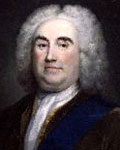 |
Robert Walpoleb. 26 Aug 1676, Houghton Hall, Norfolk |
| Ministerial offices: | Member of the Council of the Lord High Admiral (Jun 1705 - 1708) |
| Secretary at War (25 Feb 1708 - 1710) | |
| Treasurer of the Navy (21 Jan 1710 - Jan 1711) | |
| Paymaster of the Forces (Oct 1714 - 1715, Jun 1720 - 1721) | |
| Leader of the House of Commons (Sep 1714 - Apr 1717, Feb 1721 - Feb 1742) | |
| First Lord Commissioner of the Treasury and Chancellor of the Exchequer (11 Oct 1715 - 10 Apr 1717, 3 Apr 1721 - 11 Feb 1742) | |
| Secretary of State, Northern Department (29 May 1723 - 8 Dec 1723) | |
| Names/titles: | Sir Robert Walpole [from 27 May 1725, Knight of the Bath]; Baron Houghton, Viscount Walpole and 1st Earl of Orford [from 6 Feb 1742] |
| Biography: | |
Born into a Norfolk gentry family, Robert Walpole was educated at Eton College and King's College, Cambridge. He became the Whig MP for Castle Rising (1701-1702) and King's Lynn (1702-1712, 1713-1742). His first political posts were Secretary at War (1708-1710) and Treasurer of the Navy (1710-1711). Much hated by the Tories he lost his office when the Tories came to power in 1710. He was dismissed, impeached for corruption, sent to the Tower (1712) and expelled from Parliament (1712). However, he was back in Parliament in 1713 and after the accession of George I rejoined the government as First Lord of the Treasury (1715-1717) and chancellor of the Exchequer (1715-1717). In 1717 Walpole left the ministry dominated by James Stanhope and Earl of Sunderland. He then took advantage of party divisions to oppose the repeal of the Occasional Conformity and Schism Acts (1718) and went on to defeat the Peerage Bill in the Commons (1719). In 1720 he rejoined the government as Paymaster of the Forces. In 1721 Walpole for the second time assumed the post of First Lord of the Treasury (1721-1742). After he engineered the resignations of his rivals, Carteret (1724) and Townshend (1730), Walpole exercised the authority close to the post of modern prime minister. During his time in office Walpole developed the cabinet system, of the 'party of the crown' through extensive use of patronage, and the Commons as the center of parliamentary power. He refused a peerage in 1723, and following the South Sea Bubble crisis, successfully blackened the name of Jacobism. However, he began to lose favour with King George II (1727-1760), because of his 1737 compromise over Civil List payments, and the death in the same year of Queen Caroline, who had been a close friend. His illness following the declaration of war with Spain in 1739 led to widespread doubts about his ability to remain in office. He fought off a censure motion attacking his leadership in early 1741, but his Whig party was defeated in the election shortly afterward. Although he overcame another confidence vote over his handling of the Spanish war in 1742, he accepted a peerage in February that year and almost immediately resigned as PM. He resigned on 11 Feb 1742 due to failing health. He was named Earl of Oxford and continued to take part in debates in the House of Lords until his death in 1745. Biography source: [1, pp. 1-6]. |
|
| | |
| [1] | Englefield, Dermot; Seaton, Janet; White, Isobel (eds.) Facts About the British Prime Ministers: A Compilation of Biographical and Historical Information. New York: The H.W. Wilson Company, 1995. online |
| Image: Portrait of Robert Walpole, 1st Earl of Orford by Arthur Pond, 1742. | |
